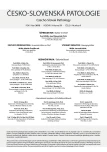-
Články
- Časopisy
- Kurzy
- Témy
- Kongresy
- Videa
- Podcasty
The criteria for appointing experts in forensic medicine
Authors: Tomáš Vojtíšek
Authors place of work: Ústav soudního lékařství Lékařské fakulty Masarykovy univerzity a Fakultní nemocnice u sv. Anny v Brně
Published in the journal: Soud Lék., 60, 2015, No. 1, p. 9-12
Category: Přehledový článek
Summary
In the Czech Republic, forensic medicine is an independent medical field, in which physicians with the appropriate attestation perform expert activities, especially in criminal proceedings, after being formally appointed by a regional court. In order to improve the quality of the activities provided by these experts, the Ministry of Justice is endeavouring to tighten up the general conditions for the appointment of new forensic experts. The individual criteria do not, however, take into account the special nature of forensic medicine as a medical field, the very essence of which involves the specialist qualifications which are necessary for the provision of expert opinions, most frequently to the police. In particular, the introduction of a strict requirement for ten-years of work experience after leaving medical school has hindered and stalled the entrance of young physicians with completed post-graduate studies into the area of forensic medicine. An inquiry sent to the regional courts has discovered that the average length of work experience for newly appointed experts in the period from 2004 to 2013 was 8.2 years, that half of them had work experience of seven years or less and that 75 percent of the newly appointed experts did not meet any set requirements for the length of their work experience at the time of their appointment. The new conditions may have a negative impact on attracting qualified graduates to forensic medicine after the completion of their medical studies and in the long term it may endanger the ability of the field of forensic medicine to provide expert opinions in criminal proceedings. In conclusion, it is the author’s opinion that the appointment conditions should be set in cooperation with the professional medical associations and that they should take into account the specific characteristics of the individual medical fields, especially if they are to be set directly by means of a legal regulation within the framework of the recodification of the standing of forensic experts in the Czech Republic.
Keywords:
forensic medicine – expertises – criminal procedure
Zdroje
1. Fryšták M., Krejčí Z. Zákon o znalcích a tlumočnících de lege ferenda. In: Fryšták M., Krejčí Z. Postavení znalce v trestním řízení. Brno: Masarykova univerzita; 2010 : 51-69.
2. Křístek L. Znalectví. Praha: Wolters Kluwer ČR; 2013 : 27-28.
3. Odborné podmínky pro jmenování znalců a tlumočníků v oboru zdravotnictví. WWW.JUSTICE.CZ > Ministerstvo spravedlnosti > Dohledová činnost > Znalci, tlumočníci a znalecké ústavy > Odborné podmínky pro jmenování znalců a tlumočníků. http://portal.justice.cz/Justice2/MS/ms.aspx?o=23&j=33&k=5863&d=321691 [cit. 9. 10. 2014]
Štítky
Patológia Súdne lekárstvo Toxikológia
Článok vyšiel v časopiseSoudní lékařství

2015 Číslo 1-
Všetky články tohto čísla
- PLÁN ODBORNÝCH AKCÍ 2015 (2016)
- Experimentální bodné poranění
- Konfrontácia poznatkov o koncentrácii alkoholu v krvi a vo vydychovanom vzduchu
- Nekroptický případ hypoplázie/dysplázie mozku
- VI. ročník Mezinárodního kongresu úrazové chirurgie a soudního lékařství
- Pribudliny v alkoholických nápojoch a ich význam pre súdnolekárske posudzovanie opitosti
- XII. Ostravské dny forenzních věd
- Kritéria pro jmenování znalců pro obor zdravotnictví odvětví soudní lékařství
- Soudní lékařství
- Archív čísel
- Aktuálne číslo
- Informácie o časopise
Najčítanejšie v tomto čísle- Kritéria pro jmenování znalců pro obor zdravotnictví odvětví soudní lékařství
- Nekroptický případ hypoplázie/dysplázie mozku
- Experimentální bodné poranění
- Pribudliny v alkoholických nápojoch a ich význam pre súdnolekárske posudzovanie opitosti
Prihlásenie#ADS_BOTTOM_SCRIPTS#Zabudnuté hesloZadajte e-mailovú adresu, s ktorou ste vytvárali účet. Budú Vám na ňu zasielané informácie k nastaveniu nového hesla.
- Časopisy



